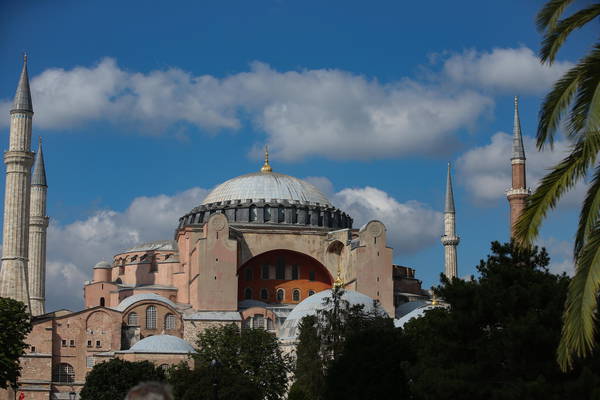Turkey: Hagia Sophia; Malnati, Trieste Vicar, deep concern
Message to the West. Let's think about incarcerations, too
17 July, 13:54Hagia Sofia and Erdogan. It seems certain that the current President of the Republic of Turkey, R.T. Erdogan, would like to "sign" his for choice for an Islamization policy with the transformation into a mosque of the current museum of the St.
Sophia building, which has been for more than a thousand years a Christian church, built for Christian worship by the Christian emperor Justinian. And the building remained a Christian Church until May 28, 1453, when Mehmet II conquered Constantinople and entered St. Sophia, deliberately removing it from Christian worship and proclaiming the Hagia Sofia mosque, in contempt and spite of the entire culture and spirituality of the West. Sultan Mehmet II's ideological goal was the humiliation and annihilation of the Christian world and culture, making this the basic criterion of the Ottoman Empire. Yet his mother was a Serbian Orthodox Christian. Not only did Europe suffer in this dangerous ideology in the Catholic and Orthodox communities. The Roman humanist and Pope Pius II, Enea Silvio Piccolomini, was deeply concerned about the religious and ideological hatred of Mehmet II, who to stem this "imperialism" and protect the Orthodox Churches of the Peloponnese asked the Venetians and the Catholic princes to stop this expansion. He did even more: he wrote to Sultan Mehmet II after he conquered Serbia in 1459, and the Peloponnese in 1460, and with ferocity the island of Lesbos in 1462, and Bosnia in 1463. His letter remained in history as the testimony of Pius II's deep concern over the fate of those populations of the Orthodox Christian faith.
In the latter document, Piccolomini asked the sultan to embrace the faith of his mother, a Christian woman, and abandon hatred and expansionism, to live in peace.
Pius II's gesture was great. The West, instead, remained indifferent and short-sighted before an expansionist ideology smuggled by the religious "flag".
Erdogan often referred to the deeds of Sultan Mehmet II, thus indicating that he wanted to get away from the secularism of Atatürk, the father of the secular republic of Turkey, who had stolen St. Sophia from a cult (that was not originally hers) and made it a monument and a memorial to the past because of an ideological overcoming for a future of dialogue and respect for the cultural and religious origins of the peoples that lived in the country.
The gesture of Islamizing the Hagia Sofia is worrying! Moreover, we should think about all those imprisonments of journalists and free people who have put their lives at risk with demonstrations for a democratic, secular Turkey, which should respect the right of religious freedom.
This choice by Erdogan is a message of ideological fundamentalism to the West and even the Islamic countries, and it certainly does not go in the direction of a tolerant political society and an international community that respects plural cultures and spiritualities.
The UN and Pope Francis also expressed concern about what that gesture entails beyond the religious facade. (ANSA).














